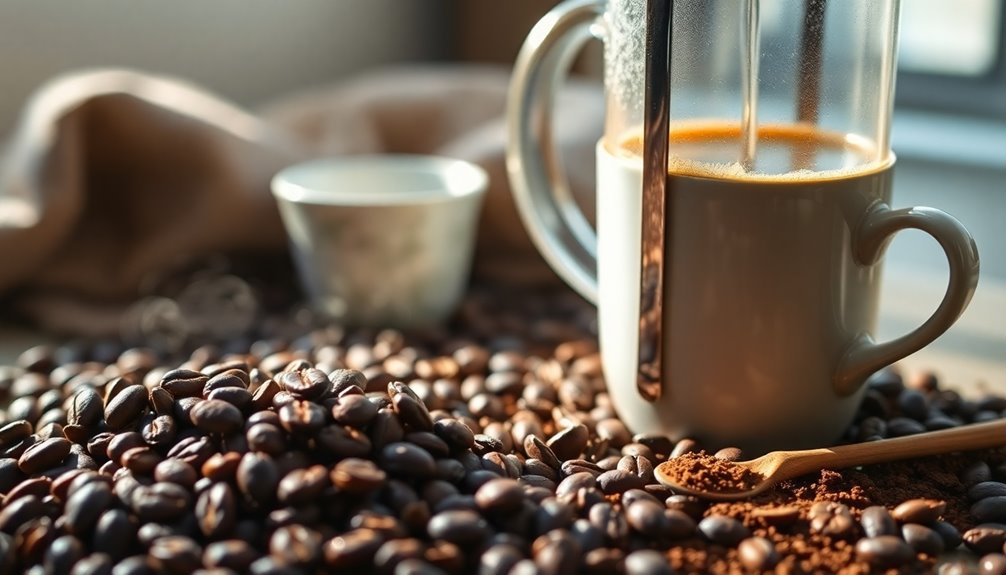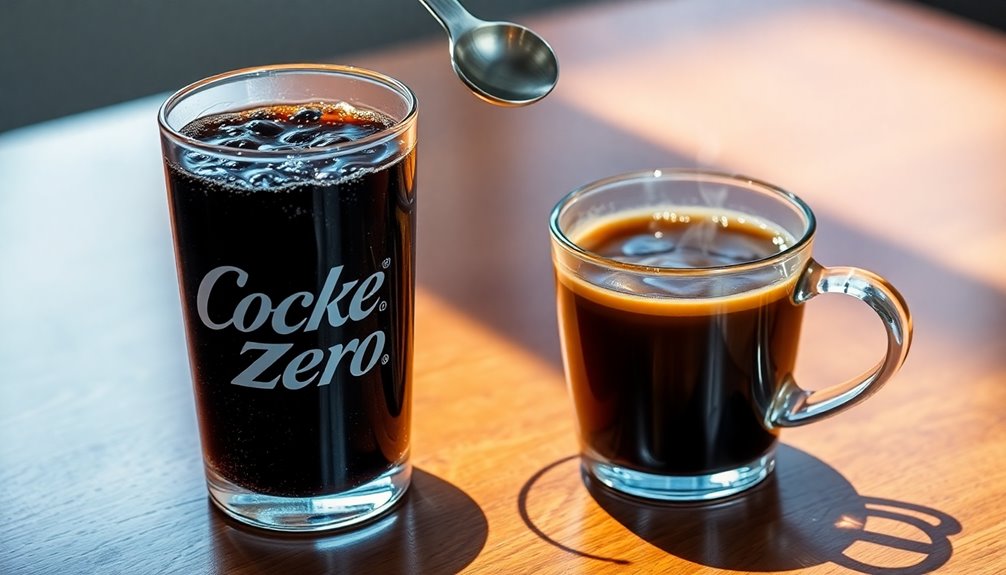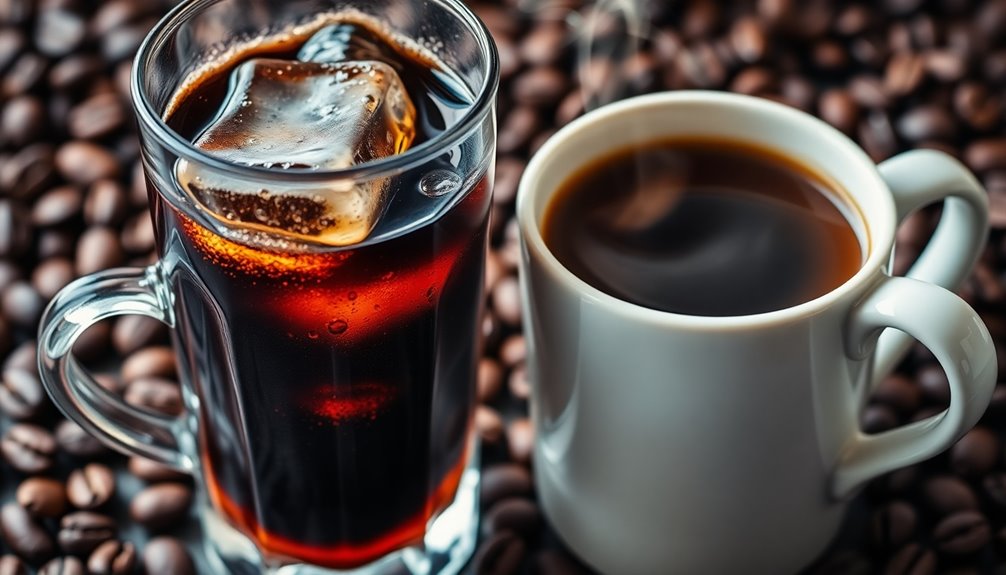Decaf coffee is regular coffee that’s had most of its caffeine removed. It typically contains 1-2% of the original caffeine content, making it a great option for those wanting coffee without the jitters, while still enjoying rich flavors. To be labeled decaf in the U. S. , it must contain less than 5mg of caffeine. Decaffeination methods vary, including chemical solvents and water processes, ensuring the taste remains intact. Many people love decaf not just for its lower caffeine levels but also for its diverse flavor profiles. Stick around, and you’ll discover even more about this popular brew! Another popular option for those looking to reduce their caffeine intake is half-caff coffee, which is a blend of regular and decaf coffee. This allows people to still enjoy the taste and aroma of their favorite brew, while cutting back on their overall caffeine consumption. Whether you choose decaf, half-caff, or regular coffee, there’s a perfect option for every coffee lover.
Key Takeaways
- Decaf coffee is made from regular coffee beans with at least 97% of the caffeine removed, containing 1-2% of the original caffeine.
- In the U.S., decaf coffee must contain less than 5mg of caffeine per serving to be labeled as such.
- Various decaffeination methods exist, including the Swiss Water process and carbon dioxide extraction, preserving flavor while removing caffeine.
- Decaf coffee can offer diverse flavor profiles, with taste influenced by bean type, roasting levels, and brewing techniques.
- Contrary to common misconceptions, decaf coffee is not completely caffeine-free and can still provide rich flavors comparable to regular coffee.
What Is Decaf Coffee?

Decaf coffee, which is made from regular coffee beans that have had most of their caffeine removed, offers a great option for those who want to enjoy the rich flavors of coffee without the jitters.
While it's not completely caffeine-free, decaf typically contains only 1-2% of the original caffeine content, and under U.S. standards, it must have at least a 97% reduction in caffeine. Various decaffeination methods, like the Swiss Water Method and CO2 Method, help preserve the coffee's flavor while removing caffeine. Notably, the Swiss Water process, developed in 1933, utilizes only water and avoids using organic solvents entirely to ensure a natural decaffeination.
EU regulations require decaf to have less than 0.3% caffeine.
History of Decaf Coffee

The journey of decaf coffee began with early discoveries that paved the way for its development.
In 1820, Friedlieb Ferdinand Runge isolated caffeine from coffee beans at the request of German poet Goethe, marking the beginning of our understanding of caffeine's role in coffee.
However, it wasn't until the early 1900s that Ludwig Roselius developed the first commercial decaffeination process, discovered accidentally when coffee beans soaked in seawater. He patented a method using steaming, which is still in use today. This method effectively removes most caffeine content while retaining the flavor profile of regular coffee.
Following the First World War, decaf coffee gained popularity as concerns about caffeine consumption grew.
How Decaffeination Works

Understanding how decaffeination works reveals the fascinating processes that allow you to enjoy coffee without the jitters of caffeine.
In the direct-solvent method, green coffee beans are steamed, rinsed with a chemical solvent, and then steamed again to remove residuals, extracting at least 97% of caffeine. This process is similar to the sugarcane process, which also removes 97% of caffeine while preserving flavor.
Alternatively, the indirect-solvent method soaks beans in hot water to extract caffeine, which is then filtered out with a solvent, letting the beans reabsorb their flavors.
The Swiss Water process uses a flavor-rich water solution to capture caffeine without chemicals, while the carbon dioxide method employs supercritical CO2 to extract caffeine, leaving flavors intact.
Each process ensures you can savor your cup without the caffeine kick.
Common Decaffeination Methods

Many people enjoy coffee for its rich flavors and aromas, but some prefer to skip the caffeine.
There are several common methods for decaffeination. The Direct Solvent Process uses solvents like methylene chloride to extract caffeine after soaking beans.
Alternatively, the Swiss Water Method relies on water and osmosis to achieve a caffeine-free result without chemicals.
For a more modern approach, the Carbon Dioxide Method employs liquid CO2 to selectively remove caffeine while preserving flavor. This method is known for its ability to maintain flavor integrity while effectively removing caffeine.
Lastly, the Indirect Solvent Process involves soaking beans in water, then using solvents to extract caffeine before returning the beans to the original water to regain flavor compounds.
Each method has its unique advantages, so you can choose what suits your taste best.
Flavor Profile of Decaf

While you might expect decaf coffee to lack flavor, it can actually offer a diverse range of taste experiences. The decaffeination process can strip some natural flavors, resulting in a milder profile that many find pleasing. Depending on the roasting method, decaf can present bright, complex flavors in light roasts or deep, rich notes in dark roasts. Medium roasts strike a balance, providing a smooth body. Additionally, the choice of decaffeination method can significantly affect the depth of flavor retained in the final brew. Keep in mind that factors like bean type and brewing technique significantly influence the final taste. Although decaf coffee may differ slightly from regular coffee, it can still deliver a satisfying experience, especially when roasted to enhance its remaining natural flavors.
Regulatory Guidelines for Decaf

As you explore decaf coffee, it's essential to be aware of the regulatory guidelines that govern its production and safety.
The FDA allows up to 10 parts per million (ppm) of residual methylene chloride in decaf coffee, but industry practices keep levels 100 times lower. For a cup to be labeled decaf in the U.S., it must contain less than 5mg of caffeine. Recent studies have shown that methylene chloride is linked to multiple cancers, raising concerns among health advocates. While a 2020 report found methylene chloride in some decaf products, these levels were still within FDA safety limits. Activist groups are pushing for stricter regulations, and California lawmakers even considered clear labeling requirements.
However, the National Coffee Association defends the current standards, emphasizing the safety of decaf coffee produced using the European Method.
Health Benefits of Decaf

Decaf coffee offers a range of health benefits that make it an appealing choice for those looking to reduce caffeine intake without sacrificing flavor.
It's packed with antioxidants, like hydrocinnamic acids and polyphenols, which help neutralize free radicals and reduce oxidative damage in your body.
You'll also find valuable nutrients such as vitamin B-3, niacin, vitamin E, potassium, and magnesium in each cup. Additionally, decaf coffee contains essential nutrients that contribute positively to a healthy diet.
Studies show that drinking decaf can lower your risk of heart disease and improve liver function.
Additionally, moderate consumption may even reduce the risk of type 2 diabetes and help manage weight.
Popular Decaf Coffee Brands

When you're in the mood for a great cup of coffee without the jitters, exploring popular decaf coffee brands can lead you to some fantastic options. Brands like Colipse Decaf Espresso and Allegro Decaf Organic Italian Roast offer specialty and organic choices, ensuring quality and sustainability. For a refreshing cold brew, try The Daydreamer from Explorer, which is 99.9% caffeine-free. It's important to note that these brands often use the Swiss Water Process to provide a chemical-free decaffeination method. If you prefer something widely available, Tim Hortons Decaf Ground Coffee and Dunkin' Decaf are both great choices, with Tim's using the Swiss Water Process. For single-serve convenience, consider Caribou Medium Roast Decaf K-Cup or Nescafe Clasico Decaf. No matter your preference, there's a decaf option that fits your taste perfectly.
Tips for Brewing Decaf Coffee

Exploring the world of decaf coffee brands can lead you to some fantastic flavors, but brewing it correctly is just as important for a great experience.
Start with a burr grinder for even grounds, aiming for a medium-fine consistency. Use a scale to measure your coffee-to-water ratio; try 1:15 for strength or 1:18 for smoothness. Remember that decaf coffee starts as fully caffeinated coffee beans, so the quality of your beans is crucial.
Heat filtered water to around 96°C and pre-infuse your brewing device. When you're ready to brew, pour water in circular motions over the coffee, letting it bloom first.
If you're using a French press, mix the grounds mid-brew for even extraction. Finally, let the water drip completely in pour-over methods before serving to ensure the best flavor from your decaf.
Enjoy!
Frequently Asked Questions
Can Decaf Coffee Still Cause Insomnia or Impact Sleep?
Yes, decaf coffee can still impact your sleep and even contribute to insomnia.
Even though it has less caffeine, the small amounts can keep you alert and disrupt your natural sleep-wake cycle. If you consume it close to bedtime, you might find it harder to fall asleep or experience reduced sleep quality.
To minimize these effects, try avoiding decaf coffee in the evening and gradually reducing your overall caffeine intake.
Is Decaf Coffee Suitable for Pregnant Women?
Decaf coffee can be suitable for pregnant women when consumed in moderation.
You should aim to stick to the recommended daily limit of 200 mg of caffeine, which typically allows for 2 to 3 cups of decaf.
While the caffeine content is low, it's still important to monitor your intake as it can accumulate.
If you have concerns, consider switching to caffeine-free alternatives like herbal teas for a safer option.
Does Decaf Coffee Contain Any Health Risks?
When considering health risks, decaf coffee can be relatively safe for most people.
While some decaf processes use solvents like methylene chloride, the FDA regulates these to ensure they remain at minimal levels. Concerns about potential carcinogenic effects exist, but research shows no significant health risks from moderate consumption.
You might still enjoy its benefits, such as reduced diabetes risk, without the jitters of regular coffee.
Always stay informed and choose wisely!
Can I Drink Decaf Coffee Every Day?
Yes, you can drink decaf coffee every day!
It's a great option if you love coffee but want to limit your caffeine intake. You can enjoy multiple cups without worrying about jitters or sleepless nights.
Plus, decaf coffee still offers some health benefits, like antioxidants.
Just keep an eye on your overall health, as some studies suggest potential risks.
As long as you feel good, enjoy your daily decaf without hesitation!
How Does Decaf Coffee Affect Hydration Levels?
Decaf coffee doesn't significantly affect your hydration levels.
Since it's mostly water, it actually contributes to your daily fluid intake just like regular water.
Unlike caffeinated coffee, decaf has minimal caffeine, so you won't experience the diuretic effects that increase urine production.
Enjoying decaf can keep you hydrated, especially when you balance it with water throughout the day.
Conclusion
In conclusion, decaf coffee offers a flavorful alternative for those looking to enjoy their favorite beverage without the caffeine kick. Understanding its history, decaffeination methods, and health benefits can enhance your coffee experience. With various brands available and tips for brewing, you can easily find a decaf that suits your taste. So, the next time you crave a warm cup, don't hesitate to reach for decaf—you'll savor the rich flavors without the jitters!









